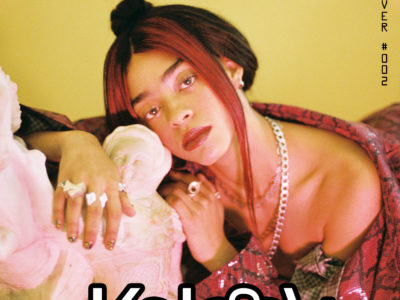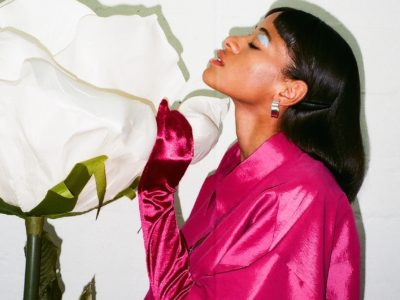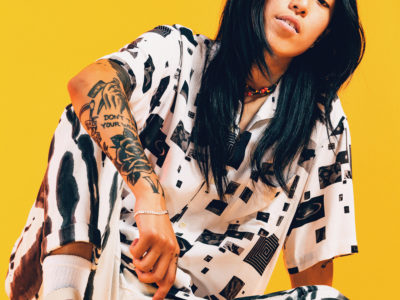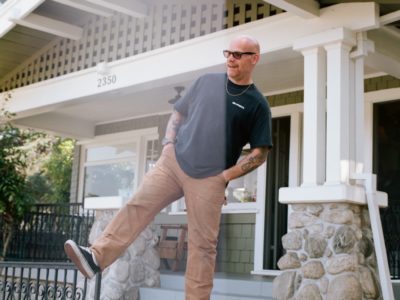Iris Alonzo + Carolina Crespo, Co-Founders of EVERYBODY.WORLD
PHOTOS BY: TRISTAN KALLAS

Carolina Crespo and Iris Alonzo are the inspiring duo behind EVERYBODY.WORLD—an eco-conscious clothing line that has something for, you guessed it, everyone.
The Eco-Conscious Brand Everybody Will Love
WORDS BY: ZARNA SURTI
After spending well over a decade each at American Apparel, Carolina Crespo and Iris Alonzo decided it was time for something new. But they didn’t go into their new venture the way most entrepreneurs do—with spreadsheets, business plans, and an underwhelming office space—they did it in their own way, authentically and with a little help from their friends. From developing their signature cotton-blend through recycled yarns (which had their manufacturer in South Carolina dubbing them the “trash queens”) to their inviting, glass-walled workspace in MacArthur Park, the duo is creating an eco-conscious line that’s designed with their friends, people they admire, and of course—their dog Charlie.

Where did the idea for Everybody.World come along? Did it start right after you both left American Apparel or was it something that happened over time?
Iris: It wasn’t immediate, immediate.
Carolina: Yeah, friends started contacting us saying, “Hey, we really need some t-shirts!”
Iris: We thought, “I guess we could cut and sew some stuff—we know everybody.” So we just started with friends and friends of friends. And then we thought, “Shit, why don’t we make more stuff?”
So you just decided, “Ok, we’re gonna do a line?”
Iris: Well we thought, “That’s actually a really good concept—let’s just invite people with good taste to design things, then we make it, we sell it, and we give them a portion of the sales.”
When was this?
Iris: This was early 2015. We took off about six months after American Apparel and we traveled and putzed around.
Carolina: We did our house and our pantries. [Laughs]
Iris: We cleaned out our closets and just bopped around LA and thought, “Let’s find all the factories we can possibly find and see who we like.” Then we’d find inspiring people and say, “You’re amazing, you have a great story, you have great taste—is there anything you’re missing?’” And we’d work to make that.
For the basics we didn’t want to do the same old thing. We wanted to have cuts we really liked, but we wanted the textile to be as eco-friendly as possible. So we said, “Ok, let’s use recycled yarn,” because there’s a lot of waste in the cutting process and that’s a big thing that weighs heavy on us. From there we thought, “Do we want to make more shit and put more stuff on the planet? How can we do this in a way where we’re a part of the solution as opposed to the problem.”

That’s amazing. I feel your pieces and think, “This feels like the Earth” and other stuff starts to feel superficial and fake.
Iris : Exactly. We went to the yarn source, which is where you get the cotton and process it to yarn—this is before it gets knit into fabric and dyed. We thought if it had been processed less, maybe it would be stronger. So we went to this company we had known for years, they’re in the Carolinas, and they happen to be the biggest yarn company in the world.
We asked them if they had waste in their process and they’re in the South, so they said, “to the tune of half a million pounds a week, little lady, how’s that sound like for waste to you?” When we asked them what they did with it, they told us it goes to the landfill and gets re-processed into cotton balls, q-tips, cotton swabs, bandaids. So we asked them if they could make it into yarn and they said it wouldn’t work. When we asked them to try, they said, “Just to prove to you little ladies that it can’t be done, because we’ve been in this business a hundred years, we’re gonna show you it can’t be done.” Then they did it and said, “Well I’ll be, it can be done.”
Carolina: They said, “You girls are the trash queens now.”
Iris: They call it trash yarn. Our goal is to take our yarn and make ten different textiles over the next few years that we can use for all cut and sew. So anybody can come to us and say, “Ok I want to do this, but with recycled textiles.”
You launched in November 2016, where did you start finding the people that you contribute with? Were they just friends to start off?
Iris: We started with Prakash. People who we admired from afar, but that we felt we could approach without anything to show them except our smiles and an idea. So Prakash is someone who plays chess in MacArthur Park everyday…is he there? [Looks out the window to the park]
Carolina: He’s there! He’s taking a nap under the tree!
Iris: He lives in a building around here and every day for the past 30 years, he’s come to play chess. He’s 75 and originally from Mumbai—he’s one of the most deeply beautiful people we’ve ever met. He’s got such gravity to his being.

Getting to work with people like that must be so inspiring.
Carolina: It is and we just paid him his first commission. He was really specific about what he wanted. He wanted the pocket to be four fingers wide, no extra button.
Iris: He wanted a slender curve at the bottom and didn’t want it to be very high.
Carolina: We showed him over a hundred fabrics!
You gave him his perfect shirt! It’s also great that you pay commission, because a lot of people use creatives in that way and then don’t pay them. They take advantage of their creativity, but how are they supposed to pay their rent?
Iris: Exactly. So we decided, “Ok, we should also have basics that we do design in-house, but let’s not just do the same old thing.” Because American Apparel was still around at that time.
I love that he’s 75 and it feels so natural for the brand. There’s been a lot of forced ageism and diversity in fashion recently and everything you’re doing feels so authentic. You even have a dog collaboration!
Iris: We’re really exploiting Charlie [the dog], don’t tell her, she’s not getting anything out of this. [Laughs]

We love Charlie! What made you decide to work with people like Delores who is 85-years-old and Akira who is three-year old? It all somehow feels so authentic.
Iris: It really just comes down to spirit. When I think of Delores, I want to cry because her personal story is so moving. She comes from a time when black wasn’t beautiful. She grew up in the South, and it was pre-Martin Luther King Jr., pre-Rosa Parks, and pre-civil rights movement. Against all odds, she went on to be very successful. She also has incredible style and is sassier than anyone I’ve met. She has such a perspective on getting dressed, because she’s been doing it for the past 82 years. So, she knows what she likes and she knows what she does not like—that to us it the perfect person to ask for an idea.
With Akira, the two-year old, he’s a friend’s kid and he’s very opinionated. He knew what he wanted to wear and he knew what he hated to wear, even though he couldn’t say the words.
Carolina: He’s always collecting little trinkets, little rocks, and little army men, so he wanted treasure pockets. Every t-shirt has two little treasure pockets that he can put his stuff in and carry it around.
So, what’s up next at EVERYBODY.WORLD?
Iris: We have six or seven collaborations coming out in the next couple of months! When we first started, our in-house manifesto was, “Make sure we’re making the most eco-friendly choices before we make a move,” because in manufacturing there are a million choices you can make and it’s either going to be something that’s shitty for the environment, something that’s neutral, or something that’s positive. So we start with the positive.
At some point everybody’s going to have to look out for that because hopefully it’ll be the law, but at this point people need to just proactively start thinking this way. You can’t continue to exploit people or the planet—it’s 2017. Those are the kinds of people that are coming to us, the ones who know they can get a tote made for $1.25 in Bangladesh—and it’s not that you want to take the work away from people in Bangladesh, but they are clearly being exploited. You’re paying more for shipping than you are for human labor, and that’s fucked up. It’s unconscionable, and companies whether they’re big or small have more of a conscience than they did five years ago—that’s for sure. So, that’s the market that we’re picking up.
Inside Their World
We popped by Iris and Carolina’s MacArthur Park studio to get a sneak peek into their world.





















